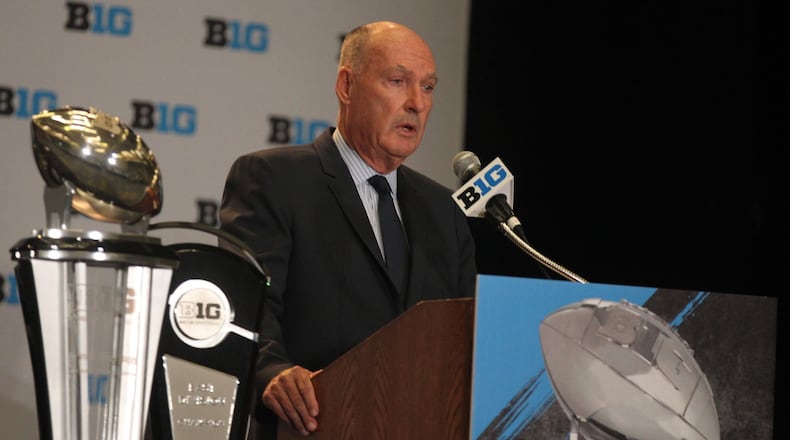1. He does not foresee the Big Ten’s football divisions changing anytime soon.
The commissioner did not sound concerned 11 teams from the East have finished the season ranked compared to seven from the West over the past four seasons.
»PRESEASON PRIMER: 5 things to know about Big Ten for 2018
“I think the data is self-evident now, but I think you’ll see greater and greater competitiveness,” Delany said. “I know in the SEC you saw a decade of Eastern dominance, and probably in the last 15 or years the West has probably been more dominant.
“So I think you’re going to see more and more competition between the two divisions which are similar, but I think your facts are the facts for now, and I don’t expect there will be any change.”
The nine-game Big Ten schedule is probably here to stay, too.
2. In light of the likelihood many states will legalize sports gambling, he favors a nationwide injury report for college football.
He called it an “availability report” because it would also include players who were suspended or ineligible.
»RELATED: Two OSU players make Big Ten’s top-10 list
“I think we need to do that nationally, and I think the reason we need to do that is probably with the exception of the home field, the availability of personnel is critical to people who are interested in gambling legally or illegally. And therefore, when players are unavailable, we should know that, if they’re probably or likely, I don’t have the model code, but I do think it’s something that we should do and probably should have done it before, but certainly should do it now.”
3. Delany would like to see the NBA allow high schoolers to enter the draft again.
“That prohibition deprives players of choice. These players should have choice, and there’s nothing that would deny them or we have no interest in denying them the opportunity to go to college or the opportunity to professionalize themselves.
»REPORT: Protection order filed against Ohio State coach
“We have to figure that out, but we’d love to have them. If they want to go to college, want to play college basketball, terrific. If they’re good enough and have an opportunity to professionalize themselves that ought to happen and in particular they ought to have the right kind of representation to make an informed decision.”
4. He declined to answer a question about moving to the “Olympic model” of compensation for players.
Allowing players to profit off their name and likeness has gained some popularity as way to increase players’ direct take from the largesse that has built around college athletics in the past decade or so, but Delany isn’t ready to discuss it.
That’s because the NCAA is still facing a lawsuit in California set to go to trial later this year that could drastically alter the way scholarships are doled out if the decision goes against the organization.
“Win or lose, I think whichever party doesn’t prevail will appeal it,” he said. “I think it will probably go to the Supreme Court, and that will bring some resolution to the issue of pay for play. Once that is resolved, one way or the other, I think that how the student participates in amateur sports, whether they’re Olympic sports, collegiate sports, little league sports, there will be plenty of time to try to resolve that.
“But I think it’s premature until the fundamental issue of can we make our rules, one, and, two, can we maintain intercollegiate athletics as we’ve known it over the last 100 years despite its weaknesses it has plenty of strengths, there will be plenty of time to discuss issues like name, image or likeness.”
He also punted on a question about changes to transfer rules.
5. Friday night football games are here to stay.
The Big Ten’s decision to add some Friday night games to the slate last fall received some pushback from member schools, fans and media, but Delany indicated the first experience worked out well.
“A number of the schools said: We’d actually like a Friday game. That’s occurred in several instances. And so it is an opportunity, I think. There are some conflicts with the high schools, but we’ve been able to really announce those games in advance. We’ve been able to work with the high school associations, and I think of the 93 games that were televised, I think there were two Friday games which wouldn’t have been there in the past. And I think they went off fairly well.”
About the Author

